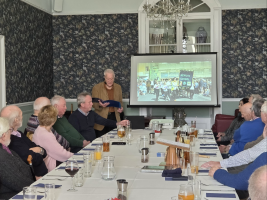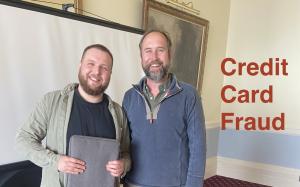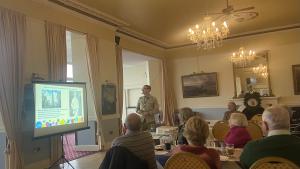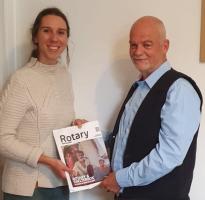Cyber Safety Essentials
We were pleased to host Craig Lang, Cyber Protect Officer from Devon & Cornwall Police, for an engaging talk on staying safe online. His presentation highlighted the Top Twelve Cyber Tips - practical steps everyone can take to protect themselves

We were delighted to welcome Craig Lang, Cyber Protect Officer from Devon & Cornwall Police, for an enlightening talk on cyber security. With cyber threats becoming increasingly sophisticated, Craig’s visit couldn’t have been more timely. His presentation offered practical advice, real-world examples, and a clear roadmap to help individuals and businesses stay safe online.
One of the highlights of the talk was Craig’s “Top Twelve Cyber Tips” – a concise and powerful checklist designed to boost our digital resilience. These tips covered everything from password hygiene to phishing awareness, and sparked thoughtful discussion among our members.
These twelve essential tips are shared below – simple steps that can make a big difference in protecting your digital life.
Top Tips
1. PASSWORDS / 2FA / 2SV. Use Strong Passwords. Consider using - ThreeR@nd0mWord$ . Your password MUST contain at least 12 characters. Don’t use the same password for all your accounts. The strongest should be for your primary email account and this password should not be used for anything else. Where possible activate 2 Factor Authentication (2FA) / Two-Step verification (2SV). This generally involves sending a text to your mobile phone to double check that it is you carrying out a particular transaction. If you have difficulties remembering lots of passwords, consider using an on-line ‘password manager’. There are various free and paid for password managers available.
2. UPDATES and APPS. Always take operating system and software updates as soon as possible. Turn on your Anti-Virus / Firewall and keep them updated. Don’t use old operating systems that are no longer supported. These are particularly vulnerable to attack. Only download Apps from accredited Apps stores.
3. BACK-UPS. Regularly back-up your important data onto a removable hard drive. Consider keeping your back-ups off-site, in a fireproof / waterproof safe.
4. PHISHING / SOCIAL ENGINEERING. Never assume incoming emails are genuine. Even if you recognise the email address because email accounts can be ‘hacked’. Never believe voice calls and text messages are genuine, even if you recognise the phone number. Phone numbers can be ‘Spoofed’ (falsified). ALWAYS CONFIRM using the contact information you have obtained from your own records or from publicly available sources. Remember – Criminals will PHISH to obtain information from you. DON’T GIVE OUT ANY SENSITIVE INFORMATION TO INCOMING CALLERS. Send all email PHISHING attempts toreport@phishing.gov.uk and send fake text messages onto 7726 (Spam). Call 159 to quickly be directed to your banks Fraud Team.
5. PRIVACY SETTINGS. Regularly check the privacy settings on your Social Media accounts and be careful what you post on social media. Do you really want everyone to know your house is empty when you are away on holiday?
6. WI-FI. Be cautious when using public Wi-Fi and don’t pass sensitive information, passwords, or bank account details over public Wi-Fi.
7. SECURING YOUR DEVICES. Ensure all your devices including your mobile phone(s) are password or PIN protected - Keep them ‘locked’ when not in use. Use Fingerprint or facial recognition if available. Only grant remote access to your device (computer / mobile phone / tablet), to someone you personally know and thoroughly trust. Never grant remote access to any incoming telephone callers. Try and avoid using publicly available USB re-charging points. These can be interfered with to compromise the security of your device (Juice Jacking). It is generally safer to charge devices from a standard electricity point or your own portable powerpack.
8. CREDIT CARDS. For added protection, please use a credit card for all your on-line transactions.
9. QR CODES. Carefully check QR codes before scanning them. Do they look genuine? Have they been tampered with? Can you do the transaction without using the QR code? Avoid Scanning from unknown / untrusted sources
10. INCOMING MESSAGES. Be wary of ALL incoming messages, including, voice calls, SMS text messages, emails and social media messages, even from persons you may know or email addresses you recognise. Remember accounts can be hacked and emails, social media addresses and phone numbers can be Spoofed (falsified). Both voice calls and videos from individuals know personally can be ‘DEEP FAKED’. Don’t rely on caller ID display. If you are concerned about an incoming call, hang up, call the caller back using another phone and the phone number YOU have obtained yourself from your own trusted sources. Never Assume, Never Believe, ALWAYS CONFIRM. Be particularly cautious of any requests you may get to change the details of a regular outgoing payment or to create a new payment.
11. Never share your passwords. Organisations including financial institutions, HMRC, the DVLA, the NHS, other Government bodies, and the Police will never ask for YOUR PIN, YOUR Passwords, YOUR personal / financial details. NEVER-EVER share those details. Any requests you get, claiming to come from such organisations WILL BE A SCAM!
12. Don’t Rush. Question Everything / Seek Advice / Never Assume, Never Believe, ALWAYS CONFIRM. Go to Have I Been Pwned: Check if your email has been compromised in a data breach to see if your email has been involved in a data-breach.
Services
The Service Previously known as Devon and Cornwall Alert is now called “Community Messaging” – Information and Sign Up can be found here - Home Page – Community Messaging , existing members should see no change or disruption to the service.
Related pages...

Golowan Community Interest Company
more Mike Ward and Alan Shepherd outlined how Penzance’s cultural profile has evolved, the vital role of Golowan CIC, and the organisation’s recent challenges and opportunities as it secures new premises and seeks support to sustain its work

Credit Card Fraud Awareness
more Photographed alongside his father, Rotarian Jon Matthews, speaker Kern Matthews delivered an insightful talk on the evolving landscape of credit card fraud and how consumers can protect themselves.

Housing Leader Shares Insights with Rotary Members
more We recently welcomed Allister Young, Chief Executive of Coastline Housing, for a lunchtime talk that shone a spotlight on one of the most pressing issues facing Cornwall today: the housing crisis.

Morrab Gardens: 18 Years of Community Spirit
more Rotary Satellite Club member Yukari Werrell reflects on Falun Gong practice and its lasting impact on Penzance’s public park.

Tuna Tag Saga!
more The club welcomed Jessica Rudd who gave a fascinating talk on predator-prey dynamics and post-tagging behaviour in Atlantic bluefin tuna - cutting-edge topics that form part of her Doctorate (PhD) research at Exeter University

Floyd Steadman OBE - a remarkable role model
more Floyd Steadman visited Penzance Rotary to talk about his life so far including the hardship of his early childhood, family tragedy, racism, but above all, about determination and achievement.

Cornwall Rural Community Charity
more We were delighted to welcome Katherine Nissen, CEO of Cornwall Rural Community Charity (CRCC), to our recent lunchtime meeting. Katherine spoke with passion and warmth about her work leading CRCC and shared stories of projects that make a real difference.
back to page above this...

Lunches and guest speakers
back The club meets each Friday lunchtime and up to twice each month members and guests enjoy a talk by a speaker. Talks cover a wide range of subjects with most being community focussed. Others may cover a speaker's special interests.